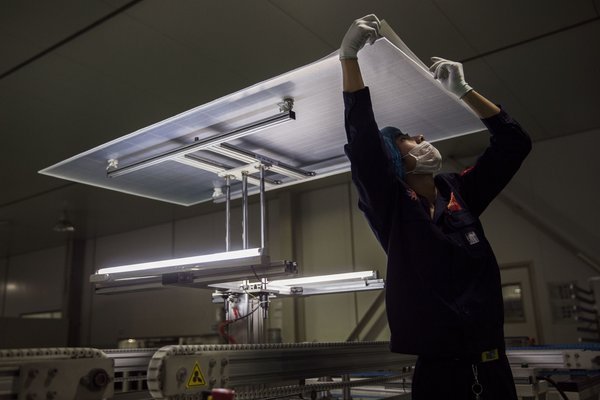(单词翻译:单击)
HONG KONG — China’s commerce ministry strongly criticized Wednesday afternoon the United States’s decision to impose broader anti-dumping and anti-subsidy tariffs on solar panels from China, but stopped short of threatening specific retaliation.
香港——中国商务部周三下午强烈谴责了美国对中国太阳能组件征收反倾销、反补贴关税的决定,但没有明确透露反击措施。

Solar panel manufacturing “is a strategic emerging industry related to global sustainable development,” the ministry said in a news release, adding that, “China urges the U.S. to solemnly consider the serious consequences caused by the U.S. ruling, to strictly comply with international rules and regulations, to adopt a responsible attitude and behavior to appropriately manage trade frictions.”
商务部在一则声明中说:“光伏产业是关系全球可持续发展的战略新兴产业,妥善处理光伏产品贸易摩擦,推动各国产业加强对话与合作,有助于全球新能源领域的健康发展。中方敦促美方慎重考虑美方裁决造成的严重后果,严格遵守国际规则,采取负责任的态度与行动妥善处理贸易摩擦。”
The new American tariffs, announced Tuesday, include anti-dumping duties of 26.71 percent to 78.42 percent on imports of most solar panels made in China, and rates of 11.45 percent to 27.55 percent on imports of solar cells, a key component, that are made in Taiwan. In addition, the department announced anti-subsidy duties of 27.64 percent to 49.79 percent for Chinese modules.
周二宣布的双反关税包括对从中国进口的大部分太阳能板征收26.71%到78.42%的反倾销关税,对台湾生产的太阳能电池征收11.45%到27.55%的反倾销关税。此外,美国商务部还将对中国太阳能组件征收27.64%到49.79%的反补贴关税。
The penalties, which are still subject to final confirmation by the International Trade Commission in Washington next month, are the latest round in a series of trade battles between Beijing and Washington over the past four years involving China’s rapid rise to dominance in solar panel manufacturing.
该决定还需由华盛顿的国际贸易委员会下月做出终裁,是过去四年来北京和华盛顿之间一系列贸易战的有一个回合。在光伏产业领域,中国已经迅速成为一股主导力量。
The call for the United States to “appropriately manage trade frictions” appeared to be the latest hint of a broad desire in Beijing to pursue a negotiated settlement, along the lines of last year's agreement between Beijing and the European Union. Officials in Brussels effectively set an annual quota for solar panel imports from China, provided that Chinese companies charged a fairly high price for those shipments, which would help European companies compete.
中国要求美国“妥善处理贸易摩擦”的呼吁似乎又是一个暗示,意味着北京希望寻求通过谈判解决问题,遵循去年北京与欧盟达成的协议的相同路线。布鲁塞尔的官员当时为来自中国的太阳能板制定了一个年度配额,前提是中国公司必须保持较高定价,让欧洲公司有能力竞争。
That arrangement helped the Chinese industry stanch the heavy losses it had been incurring for exporting large quantities of solar panels for less than it cost to manufacture them, which had led to bankruptcies of some of the country’s largest solar manufacturers.
这样的安排也让中国太阳能产业避免了巨额损失。以前中国以低于成本的价格出口,损失巨大,一些最大型的光伏企业倒闭。
He Weiwen, an executive council member of the Beijing-based China Society for World Trade Organization Studies, a research group loosely affiliated with the commerce ministry, said in an email on Wednesday that he thought the latest round of tariffs by the United States Commerce Department were not reasonable, and he added that the department “should consider possible solutions through consultation and negotiations.”
中国WTO研究会常务理事何伟文周三在邮件中说,他认为美国商务部这次征收双反关税是不合理的,并说美国“应该考虑通过协商和谈判解决问题”。
But the Obama administration has been hesitant to pursue a similar deal. Environmentalists have been leery of any deal that keeps prices fairly high for renewable energy, while free-trade advocates contend that quotas are worse trade restrictions than tariffs, because they encourage companies to collude in dividing up markets and, unlike tariffs, do not produce any tax revenues to help lighten the burden on other taxpayers.
但是奥巴马政府一直对是否签订类似的协议犹豫不决。环保主义者对任何旨在保持可再生能源高定价的协定持怀疑态度,自由贸易的倡导者则坚称配额是比关税更糟的贸易限制,因为它容易导致公司串通共谋分割市场,而且和关税不同的是,配额不能带来任何税收以帮助减轻其他纳税人的负担。
The commerce ministry statement also said that China would consider “exercising its rights” under the World Trade Organization.
商务部的声明还表示,中国应考虑在世贸组织的框架下“行使权利”。
The W.T.O.’s rules prohibit subsidized exports and dumping — exporting goods for less than they cost to make and ship. The rules allow countries to retaliate by restricting imports of subsidized or dumped goods, as the United States says it has done with Chinese solar panels.
世贸组织的规则禁止出口补贴和倾销——以比商品的制造及运输成本更低的价格出口。规则允许各国采取反击,限制进口补贴或倾销的商品;美国表示已对中国太阳能板采取了该反击措施。
China denies that it has subsidized solar panel exports, even though Chinese companies have indicated they exist in various public filings and in interviews granted by executives. China also denies that its companies have dumped solar panels, although the Chinese industry was wracked by a series of bankruptcies last year of some of the country’s biggest solar manufacturers, which were exporting most of their production and had sales revenues far below their costs.
中国否认补贴太阳能板出口,尽管中国公司已在各种公开文件和高管访谈中承认补贴的存在。中国还否认倾销太阳能板,即使中国业界被去年一系列大型太阳能企业的倒闭重创。这些倒闭的公司把绝大部分产品用于出口,而销售额远低于成本。
Frank Haugwitz, a longtime solar industry consultant in Beijing who is the director of the Asia Europe Clean Energy (Solar) Advisory Company, said on Wednesday that some Chinese solar panel manufacturers were considering whether to move part of their production to Malaysia, following the example of Western, Japanese and Korean companies that have moved there.
北京一位资深太阳能产业顾问、亚洲清洁能源(太阳能)咨询顾问有限公司(Asia Europe Clean Energy (Solar) Advisory Company)主管弗兰克·霍格维茨(Frank Haugwitz)周三说,一些中国太阳能板制造商在考虑是否跟随西方国家、日本和韩国公司的脚步,将部分生产环节移去马来西亚。


